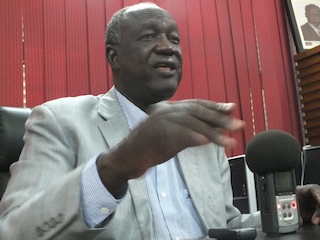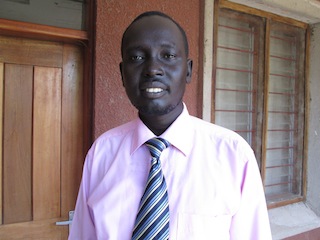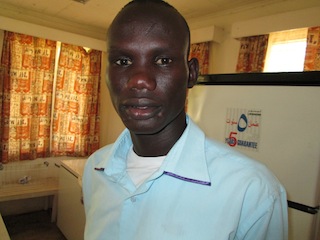Bring your families back to South Sudan, Jonglei governor tells officials
April 24, 2013 (BOR) – Jonglei state’s governor Kuol Manyang Juuk, has set January of next year as a deadline for all ministers, MPs and top civil servants to bring their families back to South Sudan.

He also said that all children of Jonglei officials – with the exception of those studying at universities – must return to South Sudan before the end of the year.
Families of many south Sudanese officials live outside the country, in order for their children to receive good education, health care, employment and a standard of life that the young nation, recovering from decades of civil war and underdevelopment, cannot offer.
Manyang, however, believes that the practice is detrimental as it encourages officials to take time off to visit relatives even when they have already taken all their annual leave.
The governor did not, however, specify how many leave days government officials are granted a year, but said that many of them “create a reason to go” such as illness of a family member or that they themselves need a medical check up.
“Why even go for medical [treatment] in those counties when we have our own doctors here. Myself, I never went for medical check up anywhere”, Manyang said in an interview on Wednesday.
“All the government officials who have their children and families outside of South Sudan, should bring them back as latest [as] January. I have been talking to them in many occasions and they have not been taking me seriously”, said Manyang.
The governor said he does not see the the “logic of us keeping our children and families outside of South Sudan as we are now an independent country.”
“We fought the war of liberation and spilling blood, losing a lot of people, many people martyred and we voted for independence, and now we are independent, what do we do next, is to build national horizontally,” he stressed.
Manyang said he discovered, during his last visit to Uganda, that 40,000 children from South Sudan were studying in and around the country’s capital, Kampala.
The fees that we are paying in Uganda should have been spent in South Sudan, he said, arguing that his policy should be rolled out across the country, which has one of the worst levels for literacy in world.
The practice of parents returning to South Sudan without their children was harming the growth and future of the country, he said.
“You need to bring up your child in your own image that means you need to be with your child through the time until that child becomes 18 years”.
South Sudanese who can afford to, often send their children to neighbouring Uganda, and Kenya as well as other countries for all levels of education. But the governor questioned the practice:
“If it is because of boarding schools, can we not put boarding schools in the state, I believe we can. If the teachers in Uganda or in Kenya are better than our teachers, which I don’t think, our teachers who finished their Universities in Uganda, Kenya, Ethiopia, Sudan and South Sudan are qualified. There is no way other teachers in those countries may be better than our teachers. And if there is anything missing, let us do it here correctly.”
On Thursday, Manyang’s deputy, Hussein Maar, said that the governor’s idea was a good one, but needed to be discussed by the state’s executive. He said that families that left during the civil war to United States, Europe, Australia and Canada, among others, and have already acquired other citizenships should not be part of the Governor’s new policy.
Maar’s family members currently live in the United Kingdom.

He said that having their own children in the state would mean that when politicians and officials “discuss the budget they will know that there are things which must be improved [such as] salaries for teachers, schools structures and so on”.
This would also mean that the government would learn from their children’s experience of South Sudan’s education system and be aware, if they were not being taught properly, Aleer said. The policy, he added, would also “push the government to inspect the teachers”.
But despite being beneficial to the education system in South Sudan, Aleer said that the policy would have a negative impact on the children forced to leave their studies abroad and return.
“The children in other parts of the world, Kenya, Uganda , Europe, Australia and America, when they come to South Sudan [Jonglei], they would be affected by this educational system”, he said.
Nobody, Aleer emphasised, should dictate where someone’s family should be.

Garang Aleu Anyang, the principal of Malek Academy, one of the best secondary schools in the state, agreed with the governor’s idea of bringing back all the families to South Sudan and to Jonglei state in order to improve education.
“Education should be brought back home, not continue spending lots of money to improve foreign education”, he said.
(ST)
Education in South Sudan
South Sudan is believed to have the worst literacy rate in the world, behind even Mali and Niger. A July 2012 report by the Overseas Development Institute (ODI) found that less than 2 percent of the population has completed primary school education.
Adult Literacy: 27 percent (2009)
Primary School Enrollment
- 2006: 700,000
- 2010: 1.6 million
Government Education Spending
South Sudan allocates 16 percent of the national budget to education. However opposition political parties and aid agencies claim the real figure is less than 10 percent.

